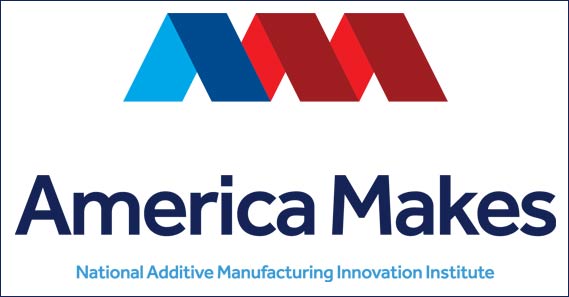America Makes Announces Fourth Project Call Winners

Latest News
July 28, 2016
If every government project rolled along as smoothly as America Makes (formerly NAMII), the US, and perhaps the world, might be a very different place. Since its inception in 2012, America Makes has fostered cooperation between private and public entities to develop additive manufacturing (AM), handing out millions of dollars in awards and grants to further research in all areas related to the technology.
This month marks the end of the fourth Project Call, which was launched in March 2016. Seven teams will share 5.5 million from the AM institute, along with an equal amount in matching funds from public stakeholders for a total of $11 million in new funding. This year’s project call focused on specific areas of America Makes’ “Technology Roadmap.” More specifically, the projects foster development in design, material, process, value chain and AM genome.

“We are excited to get the projects from this latest Project Call underway as they achieved an unprecedented level of balance between advancing the technical R&D industry needs and developing solid workforce, education and outreach plans that are so crucial to the successful transition and commercialization of the project outcomes,” said Rob Gorham, America Makes Director of Operations. “America Makes and its membership community are committed to ensuring that the US manufacturing workforce is educated in using AM innovations for our nation’s economic competitive advantage.”
This year’s winners and associates will focus attention on the following areas.
Led by Carnegie Mellon University, one project will develop a computational system and educational materials for the optimal design and AM of 3D core (i.e., tooling) structures central in the aerospace industry.
UTEP will lead a team dedicated to advancing AM build volumes and production rates by exploring the combined capability of large-scale AM with wire embedding due to its ability to introduce wire harness features directly into structural components.
Wolf Robotics and its partners will work to position the AM industrial user base to take advantage of the lower cost and increased flexibility associated with scalable, multi-axis (nine and above) robot systems.
Led by 3D Systems Corporation, another project will endeavor to develop physiologic-like printable materials for multi-jet printing (MJP) to address the current lack of printable materials suitable for biomimetic modeling within the healthcare field.
With assistance from its associates, Phoenix Analysis & Design Technologies, Inc., will focus on lattice structure design and manufacturing, with the goal of reducing material waste.
The Youngstown Business Incubator, in cooperation with other business entities, will strive to transform the US industrial base via the development of next-generation sand printers that offer line speed production of printed cores and molds that are also economically viable for small- and medium-sized enterprises (SMEs) to procure and integrate into full production lines.
Led by Raytheon, a project will seek to advance AM from 2D-constrained designs to conformal and embedded solutions to enable multi-material printing of integrated 3D electronics and non-planar structures as the commercial, aerospace, biomedical and defense industries have many applications that could benefit from novel, dense, and affordable 3D electronic packaging.
Below you’ll find a video about America Makes.
Source: America Makes
Subscribe to our FREE magazine, FREE email newsletters or both!
Latest News
About the Author
John NewmanJohn Newman is a Digital Engineering contributor who focuses on 3D printing. Contact him via DE-Editors@digitaleng.news and read his posts on Rapid Ready Technology.
Follow DE





